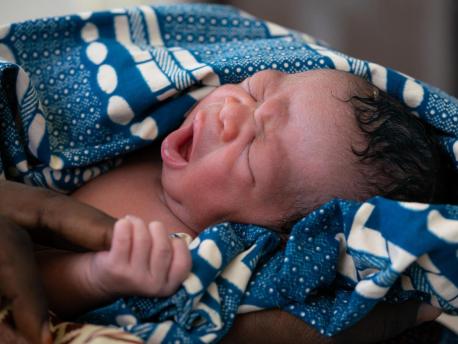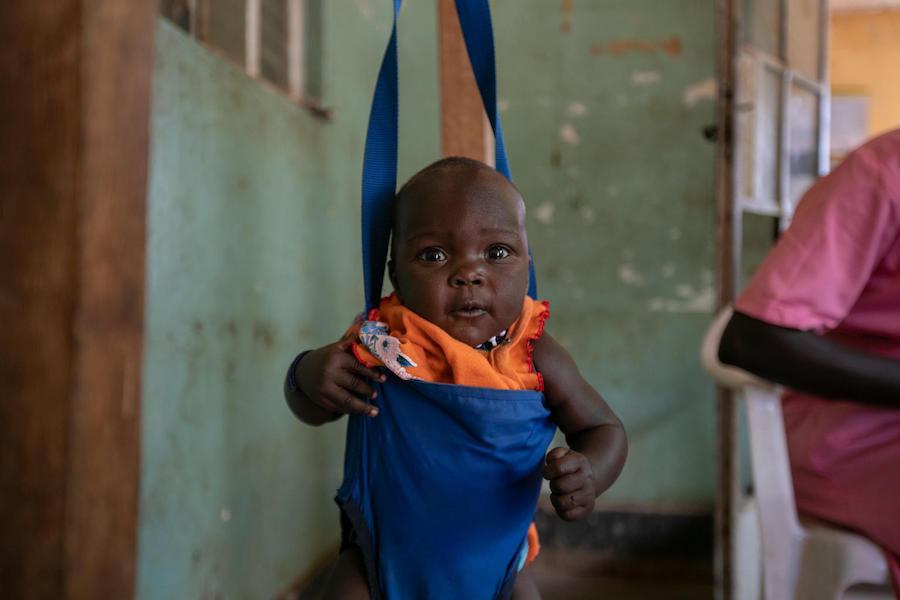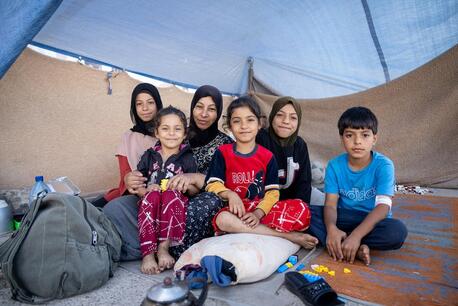
Saving Newborn Lives Is a Priority for UNICEF
"Around the world, birth is a joyous occasion. Yet every 11 seconds, a birth is a family tragedy," says UNICEF Executive Director Henrietta Fore. "A skilled pair of hands to help mothers and newborns around the time of birth, along with clean water, adequate nutrition, basic medicines and vaccines, can make the difference between life and death. We must do all it takes to invest in universal health coverage to save these precious lives."
More mothers and their children are surviving today than ever before, according to the most recent child and maternal mortality estimates by UNICEF and the World Health Organization (WHO). But we have a long way to go: 7,000 newborn babies die every day, mostly from preventable causes. UNICEF's global campaign, Every Child ALIVE, calls on world leaders, health care workers, communities and families to come together to provide affordable, accessible and quality health care for every mother and baby, starting with the most vulnerable.

Women and newborns are most vulnerable during and immediately after childbirth. In Nigeria, where over 600 newborn babies die every day due to lack of access to quality health care, newborn mortality in the Yola region is being reduced through simple and practical measures, including training for health workers, clean water in health clinics, and supplies such as sterilizers and midwifery equipment. Above, 31-year-old Hajara Umar's baby girl, Harira, was born safely in Nana Asma'u clinic in Yola in October 2018, thanks to the skilled care of UNICEF-trained midwife Rahama Kadafa (right). © UNICEF/UN0261813/van Oorsouw

In Tanzania, an estimated 39,000 newborns die every year from treatable causes, including prematurity, complications around birth and infections. Although the numbers are decreasing, there is still a lot to be done. UNICEF has set up a Neonatal Intensive Care Unit in Mbeya Regional Referral Hospital in southwestern Tanzania to provide safe and timely care for underweight babies. UNICEF also helped train medical staff on how to handle emergency deliveries. Little Isaka (above) was diagnosed with sepsis and successfully treated with lifesaving antibiotics. © UNICEF/UN0270557/van Oorsouw

More than four years of armed conflict in Yemen have had a grave impact on the lives of mothers and newborns across the country. Every two hours, one mother and six newborns die from complications during pregnancy or birth. Nineteen-year-old UNICEF-trained community health worker Afrah (above) visits vulnerable infants and their mothers for health checks in rural Yemen. © UNICEF/UN0318209/Alahmadi

“With greater stability in the country, access to those in need has improved, allowing us to treat more than 100,000 children suffering from severe malnutrition in the first five months of the year,” said Mohamed Ag Ayoya, UNICEF’s Representative in South Sudan. But malnutrition levels remain critical: more than 1 million children are malnourished in South Sudan. UNICEF has collaborated with Action Against Hunger (ACF) to run support groups to inform mothers on the importance of breastfeeding, diet and hygiene. Above, Wel Wel, 13 months, is fed porridge by his mother at a mother-to-mother support group in Aweil, South Sudan. © UNICEF/UN0345155/Wilson

In Uganda's Kaabong District, mothers receive newborn kits provided by UNICEF and partner Korean International Cooperation Agency (KOICA). The kit comes with hygiene products for both mother and infant, a towel to keep the baby warm and a bag for storing the baby's clothes. Above, Longom Esther holds her new baby, born at Kaabong Hospital. © UNICEF/UN0306361/Abdul

Basic services like vaccination, medical treatment, adequate nutrition and clean water and sanitation become matters of life and death when children do not have access to them. Above, a baby is weighed before immunization at a UNICEF-supported health center in Kaabong District, Uganda. © UNICEF/UN0306442/Abdul
Despite the immense global efforts put in to alleviate the suffering and preventable deaths of infants and mothers worldwide, the situation remains critical. UNICEF is calling for universal health coverage, starting with four main pillars:
- Functional health facilities, with electricity and safe, clean water
- Midwives and other health workers equipped with training and tools
- Lifesaving drugs and equipment
- Mothers and families empowered to demand and receive quality care
No parents should experience the heartbreak of watching their child suffer or die. Making sure every mother and baby has access to affordable, quality health care will end preventable child and newborn deaths and help every child reach her full potential.
UNICEF and partners are working tirelessly all over the world to save and protect children. You can help.
Top photo: Baby girl Harira, two hours old, was born safely in the UNICEF-supported Nana As'mau clinic in Yola, Nigeria in October 2018. UNICEF-trained midwife Rahama Kadafa supervised the baby's birth. "I want my baby to become a doctor when she grows up so that she can help women as they are helping us now," said Harira's mother, 31-year-old Hajara Umar. "She may change my life." © UNICEF/UN0261804/van Oorsouw
HOW TO HELP
There are many ways to make a difference
War, famine, poverty, natural disasters — threats to the world's children keep coming. But UNICEF won't stop working to keep children healthy and safe.
UNICEF works in over 190 countries and territories — more places than any other children's organization. UNICEF has the world's largest humanitarian warehouse and, when disaster strikes, can get supplies almost anywhere within 72 hours. Constantly innovating, always advocating for a better world for children, UNICEF works to ensure that every child can grow up healthy, educated, protected and respected.
Would you like to help give all children the opportunity to reach their full potential? There are many ways to get involved.





